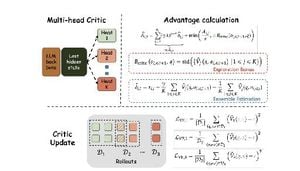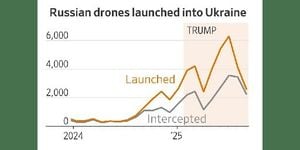Italy has become the first country to block access to the Chinese artificial intelligence (AI) application DeepSeek, citing serious privacy concerns.
The Italian data protection authority, known as Garante, announced on January 28, 2025, its decision to ban DeepSeek after the company failed to provide sufficient information about its data policies. The app was taken down from both the Apple and Google app stores with immediate effect, plunging DeepSeek's anticipated rise to fame abruptly.
Concerns over DeepSeek stemmed from its handling of personal data. Before issuing the ban, the Garante had requested clarity on what personal data DeepSeek collects, from which sources, and how it was being processed. Specifically, they sought information on whether data was being stored on servers located in China, which could pose additional security risks.
Despite the authority's investigations, DeepSeek’s initial response deemed insufficient was met with skepticism. Garante noted, "The claims contradict the authority's findings," which led to escalated actions against the AI provider.
DeepSeek was not just another AI tool; it had quickly ascended to become the top downloaded free app on Apple's app store. The growing popularity of such technology sparked panic among tech investors, causing companies like Nvidia and Google to see their stock prices tumble following the surge of the app.
Founded by entrepreneur Liang Wenfeng, DeepSeek had launched its open-source language learning model, DeepSeek-R1, earlier the same month. The company claimed their model rivaled those of established competitors, like OpenAI, stirring considerable interest and rapidly climbing download charts.
Users, unaware of the privacy concerns associated with DeepSeek, embraced the app without hesitation. Its privacy policies, as stated on its website, claimed to collect extensive user information, including profile details, chat history, and content submitted during user interaction. Alarmingly, this information, some of which was categorized as invasive data collection, would be stored on secure servers believed to be located within the People’s Republic of China.
International scrutiny of DeepSeek has widened, with regulatory bodies from regions like Ireland and South Korea also investigating the app’s data handling practices. Questions surrounding compliance with the European General Data Protection Regulation (GDPR) and transparency remain prominent. Austria's Housing Minister Clare O’Neil urged citizens to exercise caution when sharing their personal information with the chatbot.
U.S. regulators are not blind to the issues either; White House press secretary Karoline Leavitt characterized the situation as "a wake-up call to the American AI industry," underscoring the urgency of ensuring safe practices against potential data abuses.
Italy's definitive move raises eyebrows globally, fostering fears of national security risks reminiscent of discussions surrounding the popular social media app TikTok. People have raised alarms over DeepSeek's apparent biases favoring the Chinese Communist Party, particularly when confronted with sensitive topics like human rights, which it seems to censor actively.
Following its shocking ban, analysts suggest DeepSeek might still attempt to circumvent regulations by using Virtual Private Networks (VPNs) to gain entry back to the Italian market; nevertheless, experts firmly advise against it due to the app's alarming data practices.
While DeepSeek rode the wave of its fleeting popularity, it became increasingly clear to officials and organizations alike: users who prioritize their data safety must steer clear of such tools. The Italian government's bold actions reflect heightened awareness and proactive protection measures sparked by the growing influence of foreign tech firms on user data privacy rights across Europe.
With pressure mounting, it remains to be seen what the future holds for DeepSeek, both within Italy and internationally. The fallout from these events might just be beginning, laying the groundwork for stricter regulations as more nations reconsider the data privacy policies of foreign technology platforms.



